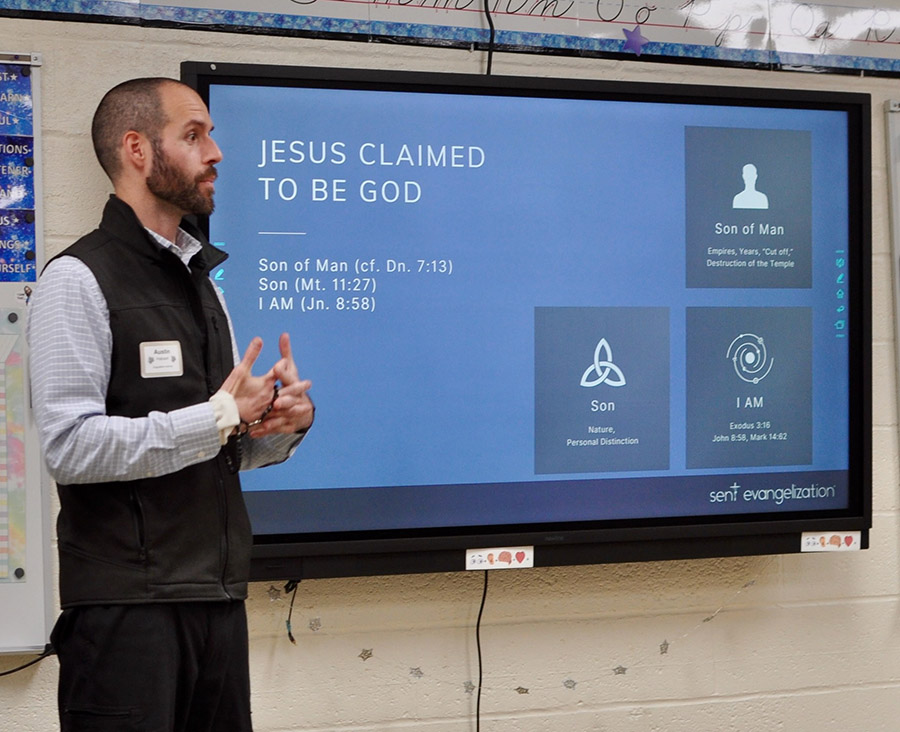
Austin Habash presented two breakout sessions at Fall Conference on Oct. 24. The former seminarian and Carthusian monk now uses his theological background to draw people to the church. (Catholic Herald photo by Anita Draper)
Anita Draper
Catholic Herald staff
“Selling” Catholicism door-to-door is Austin Habash’s passion.
A former seminarian and Carthusian monk, Habash founded Think Catholic, an organization that specializes in evangelization-focused services, and Sent Evangelization, a program that equips Catholics to evangelize their communities.
Appearing on behalf of the Augustine Institute, which partners with Sent Evangelization, Habash led two breakout sessions at the Oct. 24 Fall Conference in Rice Lake. Habash’s second session was named for the acronym “G.O.S.P.E.L.,” which stands for:
God exists
Our Creation
Sin
Payment
Ecclesia
Life Long endurance
After opening with a prayer, Habash showed a video explaining the acronym’s meaning – it was a review of mankind’s relationship with God, beginning with him as the Uncaused Cause and moving toward the creation of man, the fall of mankind through original sin, our debt, the church and endurance.
Characterizing the video as “deep and quick,” Habash gave viewers an opportunity to pose theological questions.
In response to the first – Why does God permit evil? – Habash referenced St. Augustine’s theory that God only allows evil if it brings about a greater good.
Atheists, he observed, do not speak of evil when they talk about human suffering, because it points to an objective good – God.
A second viewer asked, “How do you prepare for ministry? Habash responded that God “brings us through things” – our experiences ready us to do God’s work.
Habash used a government metaphor to explain human culpability in original sin. We are all implicated when Adam, first of our race, sins, he said. For example, if President Donald Trump declares war on China, we are all at war with China because Trump heads our country.
To the Bible-based question of how Cain married, moved and reproduced following the killing of his brother and his banishment from the only human family on Earth, Habash cited Aquinas’ theory that the determining principle of our humanity comes from the male line, and Cain could have married a woman from a pre-human species whose children were then ensouled through him.
Other discussion followed on how to interpret Scripture – for example, does seven days in Genesis mean literal days or just seven periods?
People struggle with not knowing how to read the Bible, Habash observed, and there’s a genre, or style, to every part. The church helps us parse out what is literal and what is liturgical.
Responding to the question of what happens to children who are aborted or miscarried, Habash cited Thomas Aquinas’ opinion that children younger than the age of reason are not capable of sin, and therefore not culpable. Aquinas believed human beings who die before baptism and before the age of reason will be “naturally happy for all eternity.”
Habash connected this to the concept of “limbo,” a place where such souls would be naturally happy but without the beatific vision of God.
As the session neared its end, Habash introduced a second evangelization strategy, the “Fundamental Five,” that he offers as a course. This apologetic foundation for the church begins with the premise that God exists; Scripture is historically reliable; Jesus claimed to be God and proved it through miracles and fulfillment of written texts, among other things; he founded an infallible church; and that church is still the Catholic Church.
The “Fundamental Five” is designed to be used as an evangelization tool. As Habash explains on Instagram, when someone asks you why you have chosen to be Catholic … “you’ll be able to answer that question with one hand.”
Habash’s book, “Catholic Neighborhood Evangelization,” is available on Amazon.
Access to more information on Habash’s ministry is on Instagram at Think Catholic; at thinkcatholic.org; at sentevangelization.org; on Facebook and podcasts and more.
